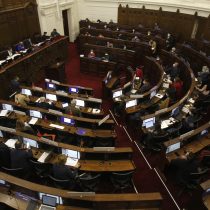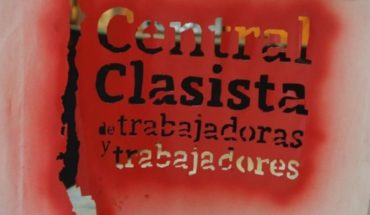
Very few understand what happened in Tuesday’s vote. El Mercurio, which so far has seen the constituent process as a clown, and its protagonists, except those of the house, as a collection of geeks, often delusional – or at least that is how I have read what has never been said in this way – said in his editorial the next day: “The plenary session of the Constitutional Convention incurred in a worrying and unprecedented violation of the formal rules that govern it.” Although it is not entirely false in the noun, all the adjectives are left over and, as Vicente Huidobro wrote, “the adjective, when it does not give life, kills”.
Politics coexists with paradoxes: supporting a candidate knowing that he will lose to have more influence in the one who wins; ally with the adversary to liquidate an ally and give the triumph to the team itself; use the possibilities of a semi-regulated space so that, bypassing the law that you want to protect, your enemies end up accepting it.
Some of the latter happened in Tuesday’s vote. The previous Thursday, the session ended abruptly, because members of the native peoples stood in front of the testera demanding to be consulted before deciding that the quorum of 2/3 would apply to the rules proposed by them. Already by then the issue of quorums – for the mysterious majority – had taken the agenda of the constituent discussion. That 2/3 here, that 4/7 or 3/5 there, simple majority, absolute, and even the threat that the process would die if it opted for the wrong fraction.
A deadline was opened until Friday to propose which rules of the regulations should be voted by 2/3 of the conventions, according to the reading that each group made of the constitutional reform that gave rise to the Convention and that, even if some do not want to recognize it, also decided on parity, indigenous quotas and the difficulties in declaring a vacancy, like that of “Pelao” Vade.
Suddenly began to circulate among the FA, the INN, those of the Socialist Collective and the “boutique” -as Felipe Harboe baptized those of the Apruebo-, the idea that approving by absolute majority the regulations in general, without voting the quorum of each norm, automatically accepted the 2/3 established in article 94 to ratify each of the laws of the new constitution.
For the PC, former members of the People’s List and representatives of social movements, this is tantamount to succumbing to the authoritarian logics of Jaime Guzmán, but in reality there are many constitutions that demand it to be corrected, including the Venezuelan (1999), the Bolivian (2009), the Ecuadorian (2008) and the Cuban (2019), all agreed under leftist regimes. Even the Pope is elected by two-thirds! Another thing is that this quorum limits the possibilities of plebiscites and is applied to the reform and creation of Organic Laws, and to the preventive control of those laws by the TC, all of which constitutes an authoritarian lock carefully concocted by the Pinochet Constitution that we are discarding and from which we hope the new Constitution will be free.
The point is that while some prefer to see the Constituent Convention as an original power, devoid of any control, alien to any previous precept and capable of conceiving the world again, others understand it as a great step forward, an unprecedented possibility, but gestated in the lands of History, where rupture and continuity cohabit. As Fernando Savater argues: “One of the main advantages of living in community is that you never start from scratch.”
No one was able to gather the 2/3 either to maintain this rule or to change it and, strictly speaking, the matter was already settled by the constitutional reform that gave rise to us and that in its article 133 states: “The Convention must approve the rules and regulations of voting thereof by a quorum of two-thirds of its members in office.” It then adds that “it may not alter the quorums or procedures for its operation and for the adoption of agreements.” However, a sector of the conventional insisted that there was no reason to prostrate themselves before parliamentary agreements of the old republic, despised by the social revolt.
Although we were not validating a special voting regulation, but a general one, aimed at establishing the organization and functioning of the Convention, some of us turned to our legal advisors to explain the consequences of this maneuver that circumvented a law to strengthen its application, which some defended out of respect for institutionality and others, among whom I count myself, convinced, in addition, of that a widely agreed Constitution is more effective, more stabilizing and more enduring than a partisan one.
According to another article of the constitutional reform that gives rise to us, it is the Supreme Court that calls upon the “violation of the rules of procedure applicable to the Convention.” If judicialized, the constituent process would be badly wounded, but it was those experts consulted who reassured us that the vice should cause harm to whoever tried to allege it, in this case the right-wing conventionists, but there was the paradox that following this path they arrived where they also wanted to go, so that there would be no damage against them.
One of the admirable aspects of this Constituent Process is the commitment it generates in various professional, academic and social organizations of very different types. In the Communications Committee we received almost sixty hearings, where the vast majority put at our disposal their knowledge, experiences and willingness to collaborate. At least for me, I lack the time to pay attention to all those who offer their help, but when advice, guidance, a knowledgeable look is necessary, there they are. It is completely absurd to pretend that each of the conventional ones is able to respond by itself to the hundreds of problems that this process poses to us on a daily basis. Whoever believes in the importance of participation, cultivates the art of asking.
On Friday, September 10, after Roberto Celedón made us cry with his memories of the blow and the pains it generated, especially to the youngest of the Convention, the members of the Socialist Collective gathered next to one of the green nymphs that hold the lanterns of the park of the Former Congress. Ricardo Montero, one of its coordinators, along with César Valenzuela, explained the maneuver woven together with the other center-left lots called to form the articulating axis of this process. Several were already aware, the lawyers of the group understood and analyzed it, while the others tried to enter it through the corner where we discovered light. What united us all was the conviction that constitutional norms were respected, even if we were walking along its edges to sentence him.
At 18 hrs. of that Friday the deadline to propose the rules to vote by 2/3 was closed. Only the right presented a list with 30. No one else. By half plus one we had to approve or reject whether each of those 30 rules would require 104 votes (2/3) to exist. On Monday there was no session and on Tuesday, those of us who lived in the brotherhood of this plan -FA, INN, Socialist Collective and those of the Apruebo- looked at each other nervously, knowing that we were entering a territory of risk.
The table had an hour to listen to different positions. Marcela Cubillos maintained that we should not be discussing something already resolved in Article 133 of the current Constitution and then Daniel Bravo, of the former People’s List, took the floor to denounce that, “as many and many will already know, certain sectors (…) they intend to avoid at all costs that there is a genuine deliberation of the conventional constituents regarding the quorum of voting (…) Aware that there are no two-thirds that support the two-thirds rule, paradoxically, those sectors are inclined to approve this voting rule only by an absolute majority (…) In other words, they are willing to break the rules they claim to respect so much (…) Our concern is given that this quorum is the last bolt, the last trap that prevents the transformations that the peoples have demanded in the street and approved at the polls.”
There were representatives of “those sectors” who defended the 2/3 arguing that there was no minority capable of blocking, a transformative majority was perfectly articulable. The truth is that the Convention is based on the tacit agreement that the neoliberal period ended, that we will go from being a subsidiary state to a social one of rights, plurinational, with ecological standards clearly of the second or third generation, a new distribution of power – within the government and throughout the territory – and several other democratizing advances. The challenge, rather than agreeing on the bulk, will be in the details. The sectors of the right in dialogue know this. In this regard, there is not much to fear.
After an hour in which the 30 proposals of Chile Vamos were rejected by all those who do not militate in its ranks, the General Regulations received 145 votes in favor, the Ethics 113, the Indigenous Participation 135, the Popular Participation 134, and the Human Rights report, devoid of its regulatory nature pto become input to all future commissions, by 113. All ratified by more than 2/3 of the members of the Convention.
Carlos Peña, in the newspaper El Austral de Osorno, accurately summarized the political effect of the maneuver: “It will allow us to maintain that it is the will of the Convention that, autonomously, decided to establish a supra-majority quorum and not the Agreement of November 15 or the Constitution of November 80. That way all sectors will be satisfied: the right and the center-left because the quorum of 2/3 will be maintained; the Communist Party because it will be able to maintain that the Convention was freed from the Agreement for Peace and the New Constitution.”
President Elisa Loncon, chosen this week as one of the 100 most influential people in the world by Time magazine, commented before closing the session: “We have taken an important step in the work of the Constituent Convention.” Then, he invited the conventional to stand up and sing the national anthem, to start our national holidays. Only Eric Chinga, representative of the Diaguitas, remained seated. The use of masks made it impossible to clearly distinguish who sang and who did not, but enthusiastic voices came out from all sectors of the chamber. When we arrived at the last verse, “or asylum against oppression”, a conventional one, which I could not distinguish, shouted: “revolution!” Lost in the chords of the general singing, his gesture went unnoticed.
The content expressed in this opinion column is the sole responsibility of its author, and does not necessarily reflect the editorial line or position of El Mostrador.





